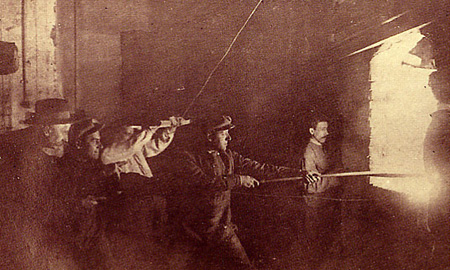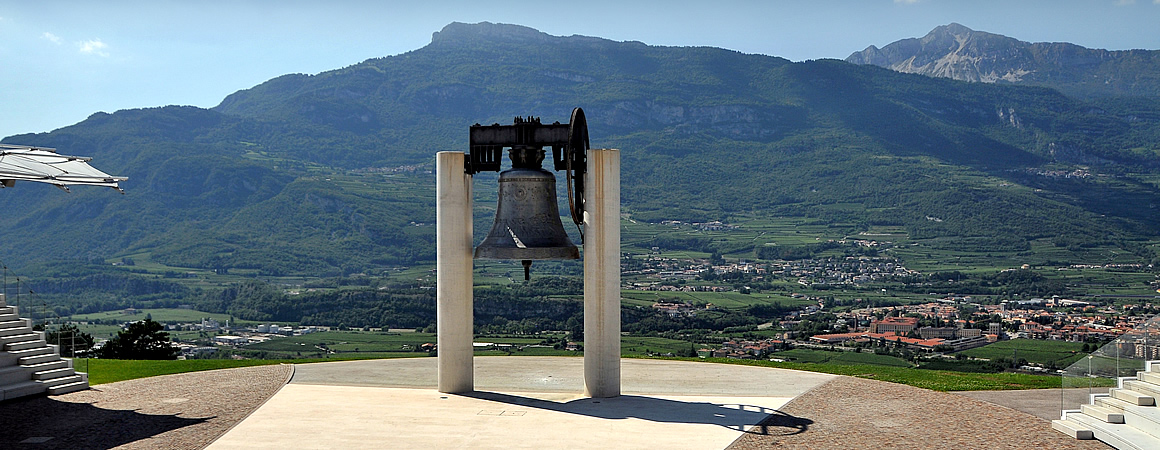At 16:30 on 12 October 1938 the inauguration ceremony took place at the Cavadini foundry in Verona for the casting of the new Bell; the service was led by the Archbishop of Rovereto, Monsignore Virgilio Parteli, and attended by a large audience. Immediately after the blessing a small procession came to the mouth of the furnace and Silvana Rancan, a member of the Piccola Italiana, handed over a silver cup full of coins sent by the former warring nations, which the authorities threw into the furnace.
The smelter then made the ritual cry "In the name of God" and the mouth of the furnace was opened. But as the liquid metal poured out of the furnace, the mould broke violently, and so the work had to be suspended.
It was a bitter moment for Don Rossaro, who recalled the words of General Cadorna after his defeat at Caporetto: "Defeats are made for victories". The smelting therefore had to be repeated; for the second attempt the pit was enlarged and reshaped, and two thousand clay bricks were used to build the shell. By the afternoon of 13 June 1939 , everything was ready for the new casting. Inside the Corona constellation on the plaster cast, Don Rossaro wanted to engrave an old motto, an invocation:
“Va là che la terza volta San Pero la benediss” (May Saint Peter bless it on the third time).
This time the casting was successful. It was happened at 17:25 and took just over 6 minutes; it was Cavadini himself who informed Don Rossaro - who had preferred not to attend - by telegram: ”Eureka [sic.], casting happily achieved, your protector helped me. Signed: Cavadini”. That day began the story of the second Bell of the Fallen, a bell whose weight was 16,28 tonnes and with a height and diameter of 3 metres. On 11 August work began on chasing the inner surface; this was entrusted to the engraver Costantino (Tino) Mendini, who undertook to complete the task within 45 days. In the meantime, on 21 August, testing was carried out to assess, above all (and definitively) the bell's sound.
In addition to the testers and the Regency Board members, the event was attended by the painter Angelo Dell’Oca Bianca and the Verona poet Berto Barbarani, acting as witnesses to the signing of the certification. Numerous trial strokes were made, revealing that the sound was powerful and well-calibrated, with tones of E-flat major. The testing took approximately half an hour, and after lengthy discussion, a memo was drafted attesting to the complete success of the casting in every aspect. But Don Rossaro had already begun the preparations for the return of Maria Dolens to Rovereto, the welcoming ceremony and the new consecration. Once again he prepared a "special issue" containing various articles detailing the Bell's story since its first casting, and commissioned the coining of a bronze medal to mark the recasting, one side showing the Bell in all its glory and the other the date of the annual commemorations of the Fallen.  For the new consecration of Maria Dolens, Don Rossaro decided to ask all the governments of the former warring nations to send a bottle containing water from a river whose name was linked to the events of the war in that nation, so that water from every country would be present at the new baptism. This idea was welcomed enthusiastically by the Ministry of Foreign Affairs and all the Embassies and Consulates, since for years the Bell had been spreading its message of universal brotherhood. Very soon Don Rossaro began to receive the “holy waters” some of them genuine artistic expressions of their places of origin. Little by little the date approached for the consecration of the Bell, and the preparations proceeded in a climate in which the "winds of war" were increasingly evident. Hitler's ongoing success on various fronts of the war aroused the fear that sooner or later Italy would become involved, above all so as not to be left out of an eventual victory that now seemed certain and quick. However, Don Rossaro was struggling with a great dilemma: to proceed with the consecration of the Bell, or not.
For the new consecration of Maria Dolens, Don Rossaro decided to ask all the governments of the former warring nations to send a bottle containing water from a river whose name was linked to the events of the war in that nation, so that water from every country would be present at the new baptism. This idea was welcomed enthusiastically by the Ministry of Foreign Affairs and all the Embassies and Consulates, since for years the Bell had been spreading its message of universal brotherhood. Very soon Don Rossaro began to receive the “holy waters” some of them genuine artistic expressions of their places of origin. Little by little the date approached for the consecration of the Bell, and the preparations proceeded in a climate in which the "winds of war" were increasingly evident. Hitler's ongoing success on various fronts of the war aroused the fear that sooner or later Italy would become involved, above all so as not to be left out of an eventual victory that now seemed certain and quick. However, Don Rossaro was struggling with a great dilemma: to proceed with the consecration of the Bell, or not.
"The war continues to wreak havoc on the countries afflicted by the scourge"
"The war continues to wreak havoc on the countries afflicted by the scourge", he wrote. "I have a feeling of repugnance when I think of a celebration for the Bell of the Fallen, but the Ministry wishes it, and therefore supports it fully. Besides, the rhythm of life continues undisturbed: this is clear when reading the cinema or sports news. An austere and solemn reminder of the sacrifices of Heroes is not inopportune; indeed, it is providential...." But the difficulties increased as the date appointed for the consecration gradually drew nearer.
Some of Don Rossaro's closest collaborators were in fact called to arms, while both the EIAR, due to broadcast the ceremony via radio, and Film Luce, for the visuals, withdrew their previous agreement. But by now the decision had been taken and it had to go ahead.






